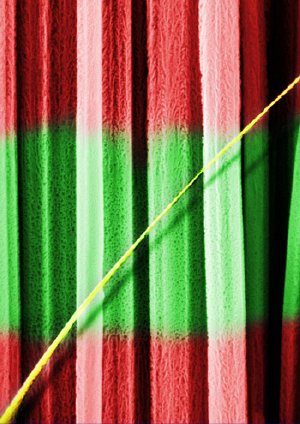Aug 2 2010
A newly discovered nanomaterial could improve healthcare devices by increasing energy storage, help realize implantable microchips or make better drugs, according to the cover story in July 25th Advanced Functional Materials.
Scientists at the University of Texas have created silicon nanoneedles with modulated porosity. The nanoporous needles are flexible, semiconductors, biodegradable and have a surface one hundred times larger that of solid nanowires. These unique properties of the nanowires will provide a higher energy density when used as large surface anodes in lithium batteries, constitute the active elements of bioresorbable, flexible microchips for subcutaneous implants or protect drugs while in the body and release them in a controlled manner to improve their therapeutic effect.
 A side view of a forest of bicolor nanoneedles. A central low porosity segment is green and two siding high porosity segments are red. An ultrathin porous wire crosses the picture sideways, in yellow.
A side view of a forest of bicolor nanoneedles. A central low porosity segment is green and two siding high porosity segments are red. An ultrathin porous wire crosses the picture sideways, in yellow.
“We have indicated that the novel combination of nanoscale dimensions of the needles with their flexibility, ability to conduct electricity, degrade in the body and have the surface of a tennis court on the tip of your thumb is crucial to develop lithium batteries that can store more energy, produce integrated circuits that can be implanted in the body and deliver drugs more efficiently. All these components are necessary to design better healthcare devices” says Mauro Ferrari, chair of the NanoMedicine and Biomedical Engineering Department.
Conducted by researcher at the department of NanoMedicine and Biomedical Engineering at the University of Texas the study first report the use of a new, rapid and inexpensive etch mechanism that uses silver nanoparticles to form nanoneedles from silicon. The needles are synthesized in a solution of hydrogen peroxide. The porosity is controlled along the length of the needle simply changing the concentration of peroxide over time. The porosity causes the needles to biodegrade in a predictable way over time, and gives them a surface 120 times larger than that of corresponding solid wires while maintaining the semiconductor and crystalline nature. The study was supported by the National Institutes of Health (NIH), the Defense Advanced Research Projects Agency (DARPA) and the state of Texas.
“We can control the size and shape of the porous structure using the same technology currently used to make computer microchips, and we are doing it to make needles with a tip smaller than 100nm. This will allow us to penetrate directly within many cells at once and delivery drugs very specifically inside them without killing the cell.” says Ciro Chiappini, leading author of the study and researcher at the University of Texas at Austin.
The researchers have also shown that they can control the dissolution of the needles over several days and thus determine the life of the resulting implantable device. They can also control the color of the needles through porosity to design nanoneedles barcodes with codebars of different colors. Since porous silicon is not harmful to cells these barcodes can be used to tag cells and chemical reactions.
“The barcodes are a very efficient system to identify cells in the natural environment without altering their functions, and we will use them to track movement of multiple cells at once. That is what I’m working on right now” says Jean Raymond Fakhoury, another author of the study.